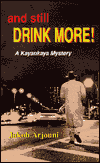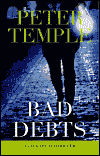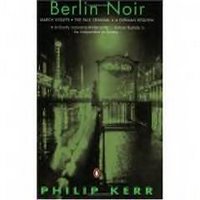
. . . or, if you're reading the edition I have,
And Still Drink More! It's the same book, Jakob Arjouni's second mystery featuring the Turkish-German private investigator Kemal Kayankaya. I've already held forth on Arjouni's
use and overuse of hard-boiled cliches in one book in the Kayankaya series and his
effective use of a familiar device in the opening of this book.
But now I'll praise Arjouni for writing a fine roman noir, helped along by effective reinvigoration of -- you guessed it -- some old devices. Here, Kayankaya is called in to investigate the death of a chemical-plant executive. The apparent suspects are four eco-terrorists whose defense lawyer asks Kayankaya to find a mysterious "fifth man" who holds clues to the real killer.
Beyond this, the book travels effectively in
Big Sleep territory with a side trip into Hammett land: The story behind the killings turns out to be hellishly convoluted, it involves family secrets, and, about three-quarters of the way through, Kayankaya offers a summing up of events, an expository passage like the ones Hammett patented in
The Maltese Falcon and
The Dain Curse and Woody Allen made fun of in his detective spoofs.
But it takes more than a protagonist who walks deserted streets, turns up his collar against the rain, and smokes a lot to make a good, dark P.I. story. Kayankaya does all that, and he also drinks too much. But Arjouni infuses the story with a distinct noir sensibility that gives life to some hard-boiled devices that might otherwise seem like so much atmospheric decoration.
Remember that old 1940s movie standby, the scene where Humphrey Bogart or Dick Powell takes a drink, and then the camera work goes all kablooey, and the hero wakes up in a sanitarium, only to escape before the evil doctor can drug him into death or permanent insensibility? Arjouni includes a version here, only it's faster, punchier, and more violent than the classic examples. But what really sets it apart is a vignette of a young man who has spent his entire life in the private clinic and has been destroyed by the experience. A hard-boiled cliche is infused with new, noir menace. And the ending is the same way. Without giving too much away, I hope, the bad guys don't suffer, and no major characters take the easy way out by dying.
Another plus here is the wisecracks. In Arjouni's
One Death to Die, at least one crack was annoying and, sin of sins, obtrusively self-referential. Here, the wisecracking is of a higher caliber. One favorite example:
"How did you end up in the profession? Being a Turk, I mean?"
"I'm a citizen of the Federal Republic."
"Oh, I see. ... Not so easy to acquire that damn citizenship, is it?"
"No problem. I mow my lawn, I laugh a lot during the carnival season, and I manage to drink beer and play skat at the same time. Somewhere past Munich lies Africa, that's where the Negroes live. I hate interruptions during sportscasts. My living-room set has been paid for. And I'm really a dancing Silesian at heart."© Peter Rozovsky 2006Labels: Germany, Jakob Arjouni, Kemal Kayankaya
 Crime fiction has yet to make an impact in this land of splendid Roman mosaics, old mosques, Punic ruins, and fine couscous. One Tunisian of my acquaintance speculates that this may be due in part to the high cost of books relative to many Tunisians' wages. Whatever the reason, I found no crime fiction on visits to one bookshop in Tunis and another in Sousse.
Crime fiction has yet to make an impact in this land of splendid Roman mosaics, old mosques, Punic ruins, and fine couscous. One Tunisian of my acquaintance speculates that this may be due in part to the high cost of books relative to many Tunisians' wages. Whatever the reason, I found no crime fiction on visits to one bookshop in Tunis and another in Sousse. On the other hand, my tour group did include an expatriate Australian now living in England who used to work with Peter Temple at the Sydney Morning Herald. She said she had no idea he had gone on to success as a crime novelist. She did say he was a generous colleague and ¨a fabulous writer."
On the other hand, my tour group did include an expatriate Australian now living in England who used to work with Peter Temple at the Sydney Morning Herald. She said she had no idea he had gone on to success as a crime novelist. She did say he was a generous colleague and ¨a fabulous writer." (To the right is a Punic figure found on the Byrsa hill in Carthage that archaeologists believe may be the oldest known depiction of Sideshow Bob.)
(To the right is a Punic figure found on the Byrsa hill in Carthage that archaeologists believe may be the oldest known depiction of Sideshow Bob.)













